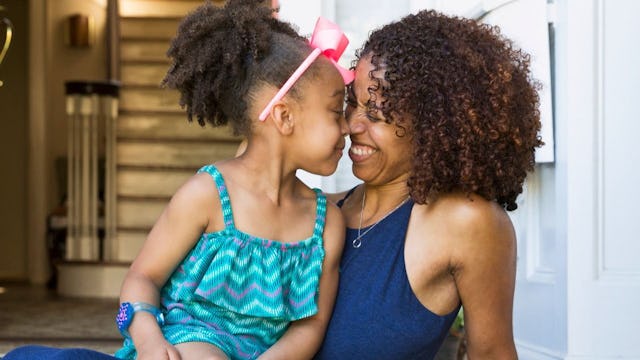Why I Worried About Not Exposing My Children To Our Black History

My childhood was made up of an assortment of memories spent at my grandparents’ house. I basically lived there — and why wouldn’t I? After all, they spoiled the hell out of me.
I had first dibs on all the best foods, a place to run off to when I felt like my mom was being a meanie, and money for almost no reason. It would take a couple decades for me to realize how awesome my mom was, but my grandparents adorned me with everything a young Black girl could want from the start. However, of all the things they gave me, the best was the knowledge they possessed having been Black migrants living in the south before integration.
Slavery legally ended with the ratification of the 13th Amendment in 1865. But ask any old Black person and they can tell you stories of a life of servitude despite being legally free. My grandparents had stories of sharecropping in the South and I was more than eager to listen. Despite being Louisiana migrants, they taught me of the significance of Juneteenth — a holiday that commemorates those of us who caught word of freedom late — from a young age. That lesson included an early understanding of the law’s inability to change the culture of oppression.
Each year, I attended events and received “Happy Juneteenth” greetings on June 19th. Texas was full of history, a mix of good and bad, and had no shortage of resources to learn that information.
Decades later, I’m now married with two children of my own and I can’t help but feel guilty that I’m raising them in an area with so few learning opportunities related to Black history. In our Midwestern town, we hear tales of cowboys, pioneer women, and a crap load of other things that aren’t culturally significant to me or my family.
The people here don’t know a ton about racism — many think it ended with slavery and don’t even know what Juneteenth is. That racial ignorance is common for white kids. But I would feel like the world’s biggest fraud if I made a living covering social justice topics and my children had no knowledge of our triumph and history as Black Americans.
Still, it’s more than guilt. There is pride in knowing that I come from an ethnic group that has made great strides and overcome so much. I want to see them present the same expressions of curiosity that I display when I listen to my grandfather talk about life in the Jim Crow south. I firmly believe my life was enriched by those stories. I was propelled forward with each retold moment of courage. The details reminded me that I am one of many who faced hardships, but I will make it through.
I recently learned our move to the Midwest made us one of many chapters of Black migration through the centuries. As it turns out, the cowboys are a part of the very history I hoped to bring to my children. After browsing the documents at the state archives, I saw newspaper clippings and photos that proved the Midwest has a richer Black history than previously given credit for. While fewer in number, Black migrants moved here in pursuit of the freedom by way of agriculture and the military.
The discovery helped me see the elder Black migrants in our new community and develop a few close relationships while getting involved with events in the Black community coalition.
I still feel guilty that my children aren’t fortunate enough to grow up near the family and accounts of the past that I did. Still, the longer we live here, the more I realize that Black History isn’t limited to a particular region. Some of us stayed in the South because it seemed easier to face economic hardship and racism with our families nearby. Others moved to the North and the West in pursuit of something different. The hardships didn’t disappear, but they presented in new forms.
We carry some of our stories with us in our memories. We leave others to be discovered by captive audiences along the way.
Like my grandparents, I carry the stories of my ancestors. Even though I only know bits and pieces, I can use public records and books to fill in the gaps. Long story short, my children will never miss out on Black culture if I teach them to see evidence of our contributions all over the world.
As Black migrants, the climate is different and the stories don’t center around the same events I’m used to. But I’m excited to help them create their own stories and appreciation for the past.
Each time I tell them bits of the Black past, they make steps towards creating our Black future.
I don’t have to feel shame or guilt about raising my children so far from the stories of perseverance that I’ve come to know and love. Because there is a whole new set of stories waiting to be heard and shared for the first time.
This article was originally published on